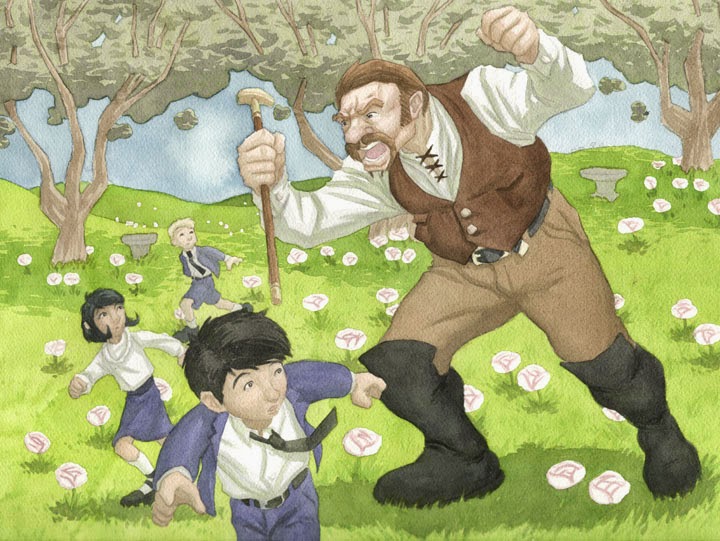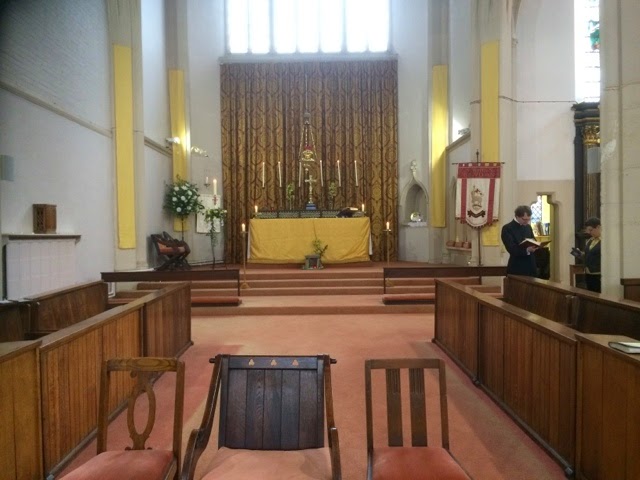We have started and the sun is shinning
Saturday 31 May 2014
Monday 12 May 2014
Easter 4
 The story of the Selfish
Giant by Oscar Wilde is one of my favourite childhood stories. The decision of
the selfish Giant to forbid the children to play in his garden plunges his
garden into a permanent winter whose grip is finally broken when through a
small gap in the wall children once again enter and play and bring Spring to
the permanent winter. There is one tree that remains frozen as the small boy
standing beneath cannot reach up to climb into its branches and so it is the
Selfish Giant who reaches down and tenderly lifts the boy into the tree. So the
Selfish Giant comes to realise that “Children are the most beautiful flowers of
all”. At the end of the story the Giant, now old and weak, looks out on the
winter landscape of his garden and sees one tree in the far end covered in
lovely white blossoms. Its branches golden and silver fruit hung down and
underneath it stood the little boy he loved but had not seen for many years.
The story of the Selfish
Giant by Oscar Wilde is one of my favourite childhood stories. The decision of
the selfish Giant to forbid the children to play in his garden plunges his
garden into a permanent winter whose grip is finally broken when through a
small gap in the wall children once again enter and play and bring Spring to
the permanent winter. There is one tree that remains frozen as the small boy
standing beneath cannot reach up to climb into its branches and so it is the
Selfish Giant who reaches down and tenderly lifts the boy into the tree. So the
Selfish Giant comes to realise that “Children are the most beautiful flowers of
all”. At the end of the story the Giant, now old and weak, looks out on the
winter landscape of his garden and sees one tree in the far end covered in
lovely white blossoms. Its branches golden and silver fruit hung down and
underneath it stood the little boy he loved but had not seen for many years.
The Giant hurries down into
the garden with joy but as he gets near the child he cries out “Who hath dared
to wound thee?” for on the palms of the child’s hands were the print of two
nails and the prints of two nails on his feet. “Tell me that I may take my big
sword and slay him”. “Nay” answered the child “but these are the wounds of
Love”. The child smiled on the Giant and said to him “You let me play once in
your garden, today you shall come with me to my garden, which is Paradise”. And
so when the children ran in that afternoon they found the Giant lying dead
under the tree, all covered with white blossoms.
“I
am the gate for the sheep.” Says Jesus
 In
the Story of the Selfish Giant it is he that prevents the children from playing
in the garden, it was his reaction of
anger and jealousy when he saw the children playing in his garden, that led him
to build the high wall so as to keep them out. It was when he reached out to help a small boy climb a tree that broke the spell of winter in his garden and the hardness of his own heart.
In
the Story of the Selfish Giant it is he that prevents the children from playing
in the garden, it was his reaction of
anger and jealousy when he saw the children playing in his garden, that led him
to build the high wall so as to keep them out. It was when he reached out to help a small boy climb a tree that broke the spell of winter in his garden and the hardness of his own heart.
To
think of the Church as a garden is not as strange as it may seem. The Bible
starts in a garden created by God and into which is placed humanity. The images
used by Jesus speaking about the Kingdom of God point to a place where people
can grow, be transformed and yes even have fun. Can this not also be true of
the Church?
We are
gates to the church by the way in which we make welcome the stranger or the
visitor. In the book of Acts we are given a glimpse or snapshot of the early
church. People met in each others homes and when they were together they broke
bread and recalled the life of the Risen Jesus. We read that they “enjoyed the
favour of all the people, and the Lord added to their number daily” Acts 2.47 The link between growth and “favour”
Literally being open and friendly; being welcoming and supportive is obvious.
Therefore if it was the case then it is still the case today.
The
road to such openness and welcome still stretched before us as we negotiate the
perilous landscape of our day, the competing demands for us to either allow or
forbid. This journey of course carries the memories of so many who have come to
us, come to the church, and found not a beautiful garden where they can flourish but
a high wall of selfish resentment blocking their way.
Sunday 27 April 2014
Divine Mercy Sunday
St John Paul II, canonised today, was a great advocate of associating this Sunday with the divine mercy. Here are some words from a sermon of his on the subject:
In the Messiah, crucified and risen, we recognize the features of the Lamb sacrificed on Golgotha, who implores forgiveness for His torturers and opens the gates of heaven to repentant sinners; we glimpse the face of the immortal King who now has "the keys of Death and Hades" (Rev 1:18).
Give thanks to the Lord, for He is good; for His mercy endures forever! (Ps 117:1). Let us make our own the Psalmist's exclamation which we sang in the Responsorial Psalm: "The Lord's mercy endures forever!" In order to understand thoroughly the truth of these words, let us be led by the liturgy to the heart of the event of salvation, which unites Christ's Death and Resurrection with our lives and with the world's history. This miracle of mercy has radically changed humanity's destiny. It is a miracle in which is unfolded the fullness of the love of the Father who, for our redemption, does not even draw back before the sacrifice of His Only-begotten Son.
Sunday 20 April 2014
Alleluia Christ is risen!!
We gathered in the night to rekindle the fire of love and renew our baptismal faith as we celebrate the resurrection of our Lord from the dead.
Saturday 19 April 2014
The Judas Tree
Fr John used this powerful poem as part of his homily on Maundy Thursday. In these dark hours of Holy Saturday I've found myself reflecting back on the words of the poet on remarkable forgiveness of Love.
 In Hell there grew a Judas Tree
In Hell there grew a Judas Tree
Where Judas hanged and died
Because he could not bear to see
His master crucified
 In Hell there grew a Judas Tree
In Hell there grew a Judas TreeWhere Judas hanged and died
Because he could not bear to see
His master crucified
Our Lord descended into Hell
And found his Judas there
For ever haning on the tree
Grown from his own despair
And found his Judas there
For ever haning on the tree
Grown from his own despair
So Jesus cut his Judas down
And took him in his arms
"It was for this I came" he said
"And not to do you harm
And took him in his arms
"It was for this I came" he said
"And not to do you harm
My Father gave me twelve good men
And all of them I kept
Though one betrayed and one denied
Some fled and others slept
And all of them I kept
Though one betrayed and one denied
Some fled and others slept
In three days' time I must return
To make the others glad
But first I had to come to Hell
And share the death you had
To make the others glad
But first I had to come to Hell
And share the death you had
My tree will grow in place of yours
Its roots lie here as well
There is no final victory
Without this soul from Hell"
Its roots lie here as well
There is no final victory
Without this soul from Hell"
So when we all condemned him
As of every traitor worst
Remember that of all his men
Our Lord forgave him first
Ruth Etchells
As of every traitor worst
Remember that of all his men
Our Lord forgave him first
Ruth Etchells
Thursday 17 April 2014
Maundy Thursday
The clergy of the diocese gathered outside st Paul's to be blessed by the bishop and sent out to show the love of christ to the city
In the evening we celebrate the Mass of the last supper with foot washing and keep vigil at the altar of repose - here is St Matthias
Monday 14 April 2014
Holy Week Women
It is Holy Week, and with the Church throughout the world, our parishes are reflecting on the events leading up to Jesus' death. In a series of sermons at Mass on Monday, Tuesday and Wednesday, we will think about some of the women from gospel and other traditional accounts of Jesus' last earthly days:
Monday 7:30pm, St Matthias - Mary of Bethany
Tuesday 10am, St Matthias - Veronica
Wednesday 11am, St John - our Lady
Please try to get along if you can. Even if you can't, perhaps you could make finding out more about these characters part of your observance of Holy Week.
Subscribe to:
Posts (Atom)
















